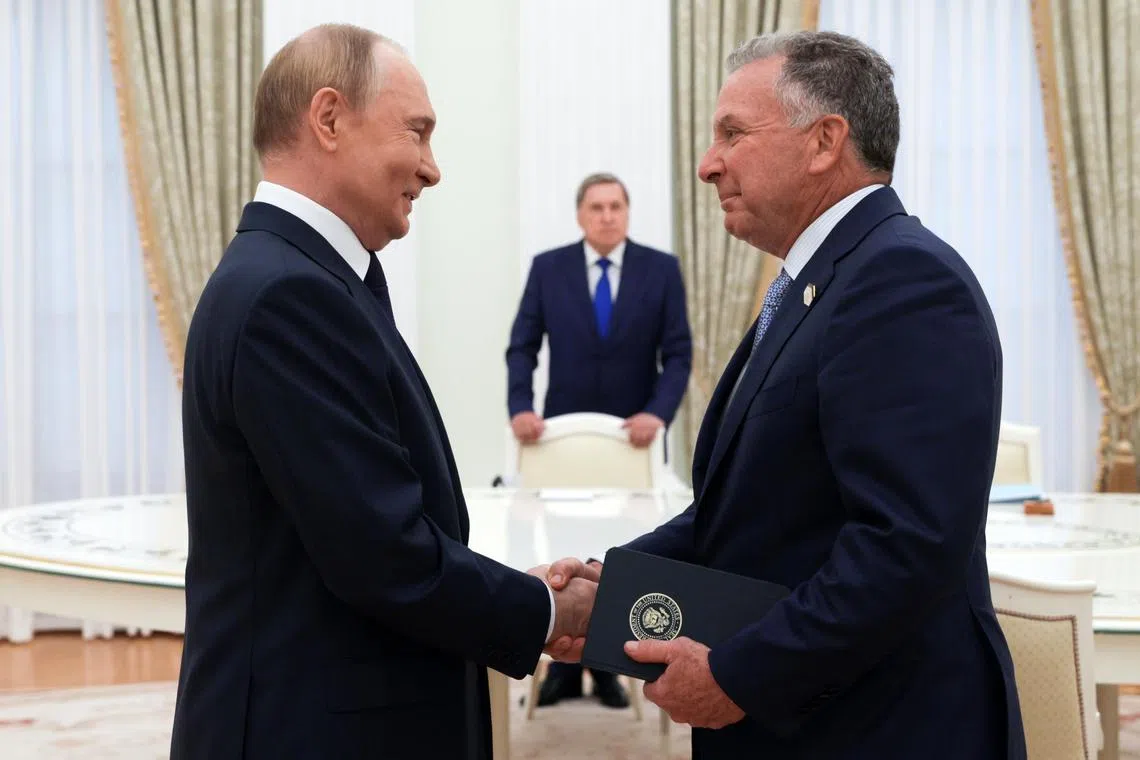Russia says Putin and Witkoff hold ‘useful’ talks as Trump’s sanctions deadline nears
Sign up now: Get ST's newsletters delivered to your inbox

Russian President Vladimir Putin (left) and US envoy Steve Witkoff shake hands before a meeting at the Kremlin in Moscow.
PHOTO: EPA
Follow topic:
MOSCOW - US envoy Steve Witkoff held “useful and constructive” talks with Russian President Vladimir Putin on Aug 6, a Kremlin aide said, two days before the expiry of a deadline set by President Donald Trump for Russia to agree to peace in Ukraine or face new sanctions.
Mr Witkoff met Mr Putin for around three hours on a last-minute mission to seek a breakthrough in the 3½-year-old war that began with Russia’s full-scale invasion
Kremlin foreign policy aide Yuri Ushakov said the two sides had exchanged “signals” on the Ukraine issue and discussed the possibility of developing strategic cooperation between Moscow and Washington, but declined to give more details until Mr Witkoff had reported back to Mr Trump.
Russian investment envoy Kirill Dmitriev, who earlier greeted Mr Witkoff on arrival and strolled with him in a park near the Kremlin, posted on social media: “Dialogue will prevail.”
There was no immediate comment from the US side.
Mr Trump, increasingly frustrated with Mr Putin over the lack of progress towards peace, has threatened to impose heavy tariffs on countries that buy Russian exports.
He is exerting particular pressure on India
The Kremlin says threats to penalise countries that trade with Russia are illegal.
It was not clear what Russia might offer to Mr Witkoff in order to stave off Mr Trump’s threat.
Bloomberg and independent Russian news outlet The Bell reported that the Kremlin might propose a moratorium on air strikes by Russia and Ukraine – an idea that was mentioned last week by Belarusian President Alexander Lukashenko during a meeting with Mr Putin.
Such a move, if agreed, would fall well short of the full and immediate ceasefire that Ukraine and the US have been seeking for months.
But it would offer some relief to both sides.
Since the two sides resumed direct peace talks in May, Russia has carried out its heaviest air attacks of the war, killing at least 72 people in the capital Kyiv alone.
Mr Trump last week called the Russian attacks “disgusting”.
Ukraine continues to strike Russian refineries and oil depots, which it has hit many times.
Ukrainian President Volodymyr Zelensky said on Aug 6 that Russia had attacked a gas pumping station in southern Ukraine in what he called a deliberate and cynical blow to preparations for the winter heating season.
Russia said it had hit gas infrastructure supplying the Ukrainian military.
Mr Andriy Yermak, chief of staff to Mr Zelensky, said on Aug 6 that a full ceasefire and a leaders’ summit were required. “The war must stop and for now this is on Russia,” he posted on Telegram.
‘Last ditch effort’
Mr Putin is unlikely to bow to Mr Trump’s sanctions ultimatum
“The visit of Witkoff is a last-ditch effort to find a face-saving solution for both sides. I don’t think, however, that there will be anything of a compromise between the two,” said Professor Gerhard Mangott, an Austrian analyst and member of a group of Western academics and journalists who have met regularly with Mr Putin over the years.
“Russia will insist it is prepared to have a ceasefire, but (only) under the conditions that it has formulated for the last two or three years already,” he said in a telephone interview.
“Trump will be under pressure to do what he has announced – to raise tariffs for all the countries buying oil and gas, and uranium probably as well, from Russia.”
The Russian sources told Reuters that Mr Putin was sceptical that yet more US sanctions would have much of an impact after successive waves of economic penalties during the years of war.
The Russian leader does not want to anger Mr Trump, and he realises that he may be spurning a chance to improve relations with Washington and the West, but his war goals are more important to him, two of the sources said.
Mr Putin’s conditions for peace include a legally binding pledge that Nato will not expand eastwards, Ukrainian neutrality, protection for Russian speakers, and acceptance of Russia’s territorial gains in the war, Russian sources have said.
Mr Zelensky has said Ukraine would never recognise Russia’s sovereignty over its conquered regions and that Kyiv retains the sovereign right to decide whether it wants to join Nato.
Mr Witkoff, a real estate billionaire, had no diplomatic experience before joining Mr Trump’s team in January, but has been simultaneously tasked with seeking ceasefires in the Ukraine and Gaza wars, as well as negotiating in the crisis over Iran’s nuclear programme.
Critics have portrayed him as out of his depth when pitched into a head-to-head negotiation with Mr Putin, Russia’s paramount leader for the past 25 years, and at times accused him of echoing the Kremlin’s narrative.
In an interview with journalist Tucker Carlson in March, for example, Mr Witkoff said there was no reason why Russia would want to absorb Ukraine or bite off more of its territory, and it was “preposterous” to think that Mr Putin would want to send his army marching across Europe.
Ukraine and many of its European allies say the opposite.
Mr Putin denies any designs on Nato territory, and Moscow has repeatedly cast such charges as evidence of European hostility and “Russophobia”. REUTERS

